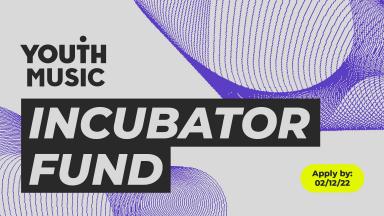Things that helped to sway our decisions
Projects that were a good match with the Incubator Fund criteria
A really simple way to give yourself the best chance of success if to ensure you follow the fund criteria, which is outlined in the applicant guidance notes. A bit like applying for a job, we use these criteria to assess applications and identify which ones are the best fit for the fund.
The criteria were designed in consultation with 18-25s and industry employers. They’re quite specific, based on the things you told us were required. There are some core strands that we expect all Incubator Fund programmes to offer:
- Paid work for young people
- Career development support
- Holistic support for wellbeing and access needs
These aren’t either/or options. They’re all mandatory elements, meaning that we should see each element in your programme overview and your budget.
If you were looking to run a course or training programme without the real life employment experience then we were unlikely to say yes to your application. This type of work would likely be a better fit for our Trailblazer Fund.
The creative project is so 18-25s “can plan and execute a real project, developing project management skills and building up a track record and portfolio for future employment”. The best proposals gave the 18-25s real autonomy to plan and execute, rather than working to a fixed idea with little creative control.
The fund can also be mistaken for a wage subsidy or internship scheme; it's not. The fund seeks to address some of the wider issues faced by creatives in the early stages in their career and therefore if people weren’t being paid the real living wage or equivalent for work they were doing then we were also likely to say no.
Organisations that were a good match with the fund
We’re particularly interested in supporting micro-businesses and small-scale enterprises through the Incubator Fund. Whilst profit-making companies are eligible to apply, we won’t award funding to organisations that we think could or should be paying for these kinds of initiatives themselves.
We know budgets are stretched and arguably all types of organisation need the cash. However, in line with the fund’s objectives, we focussed our investment this round on newer and small-scale enterprises (including sole traders) and we funded very few organisations with large turnovers (£500k or more). This was because we see that smaller businesses have less funds or access to capital to be able to pay for this themselves. Where we have invested in profit-making organisations we expect this work to become embedded in their future business plans and not reliant on further Youth Music funding.
In making our decisions we also thought about the 18-25s we want this fund to support, people from backgrounds who are underrepresented in the industries. Over 80% of grants awarded went to diverse-led organisations. “You can’t be what you can’t see” is a topic that came up with our 18-25 year old fund advisors, leading to a healthy investment this round in organisations with diverse staff teams.
What’s in it for the young people?
The idea behind creating paid work is that it gives young people the chance to develop skills and experience that will help them to develop a career in the industries. Can you offer that? If so, then brilliant. If not, perhaps it’s time to reconsider.
We’re also interested in legacy. Based on the skills you help to develop, the networks that you provide, where could young people go next? You don’t have to have all the answers, but its an important consideration.
The easiest way to figure this out is through consultation. Speaking to young people before and during the programme will ensure that you’re working collaboratively.
Creating meaningful experiences for young people is also very important to us. The funding guidance states that roles should last between three and 24 months and provide meaningful support for between two and 10 young people. Applications to work with significantly higher numbers are unlikely to be prioritised. Similarly, applications offering opportunities for only a few hours work per week were not seen as an attractive prospect by our 18-25 year old fund advisors.
Balancing the portfolio
As with all our decisions, we always try and spread the funding equitably across the country. In this round this meant there was higher investment in Scotland and the North East, both of which received comparatively low investment in Round One. In Round Five we would welcome more applications from the Midlands, Wales and East of England.
We also understand regional conversations about funding, and areas that are seen to benefit more than others. Our budgets and our decisions account for this, and we distribute grants equitably. Having said that, we can’t support your project if you don’t submit the application. Speak to a member of the team if you need support, and equally if there are organisations in your region you think we should be funding, let us know.
Incubator Fund Round 6
The next round of Incubator Fund is will open on Friday 24 February 2023, with a deadline of Friday 24 March. This will be the last round of the Incubator Fund, we will then be taking some time to reflect and develop a new offer for supporting young people into the music industries. For more information and to submit an application, please visit our Incubator Fund page.
If you’re not sure whether to apply or re-apply then do get in touch to book in a chat. You can reach us by email at grants@youthmusic.org.uk





